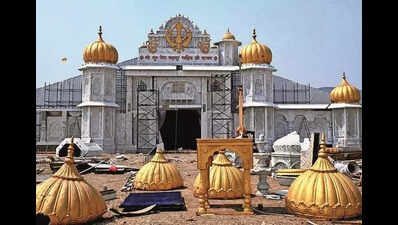Mumbai: More than a century after cinema halls proliferated in the city, single-screen theatres are undergoing a silent transformation. Owners of many of these defunct theatres are seeking permits to redevelop their properties.According to data compiled by TOI from the BMC, nearly two dozen theatre owners across Mumbai have submitted redevelopment proposals. While the majority aim to convert their venues into commercial towers, some plans include residential buildings.However, state govt regulations mandate that each redevelopment project must incorporate a small theatre within a portion of the plot. Theatre owners have said that this requirement poses a significant obstacle, citing a decline in audience numbers. Regulation 17(2) of Mumbai’s latest development plan stipulates that owners wishing to redevelop must provide 33% of the seating capacity based on the last licensed number of seats in the existing theatre, with a minimum of 150 seats or as determined by the state.For example, a 600-seat theatre must offer at least 200 seats in the redeveloped property. At Grant Road in south Mumbai, the iconic 625-seater Dreamland theatre closed permanently earlier this decade. According to redevelopment plans submitted by the owner, M/S Cine Properties & Finance, a high-end residential and commercial tower is under construction. Formerly known as Krishna Talkies, the theatre began operations in 1919 during the silent film era. In Chembur, the once-popular Sahakar cinema ceased operations years ago. Owner Sharad Doshi, whose family owned half a dozen theatres in Mumbai, told TOI, “We have submitted plans to redevelop the property into a 13-storey commercial tower.” It will feature a mix of retail, hospitality, commercial offices, and a small theatre section. Sahakar cinema operated from 1968, and its most notable employee was Chhota Rajan, who later became a gangster. “He used to work in our ticketing office, but subsequently got into the black-marketing of cinema tickets,” Doshi said.In 2020, Central Plaza cinema in Girgaum closed after becoming financially unviable amid the pandemic. Built in the mid-1930s, the theatre showcased Marathi films alongside Bollywood and Hollywood blockbusters. The owners now intend to convert the property into a residential building. In Mulund, Jawahar Talkies, an 80-year-old theatre owned by builder Dharmesh Jain, is slated for redevelopment into a part-commercial and part-residential building.Owners of the landmark Paradise cinema in Mahim also plan to redevelop their property on Lady Jamshedji Road. The proposal submitted to BMC includes three-level basements for parking and services, ground and 1st floors for shops and service areas, 2nd to 5th floors for theatre and Insignia, and 6th to 18th floors for offices. Last year, developer Wadhwa Group signed an agreement with owner of Juhu’s Chandan cinema to redevelop the property into a commercial complex. But the project has stalled after defence authorities’ refusal to grant an NOC. The matter is pending in court. In Ghatkopar (W), Uday Talkies is being transformed into a commercial tower. The original 780-seat theatre will now house a smaller 265-seat cinema hall. Despite these efforts, cinema owners contend the govt’s requirement to include a small cinema hall in redevelopment projects remains a hurdle. Developer Rashesh Kanakia, who has redeveloped several theatre properties, said audiences for single-screen cinemas have dwindled. Kanakia redeveloped the former Samrat cinema in Goregaon into a smaller Movie Max, which eventually shut due to lack of clientele. In Kandivli, Kanakia redeveloped Sona Cinema but had to close it owing to sparse patronage. In Andheri (E), the defunct Darpan cinema was converted into Cine Magic, which “is still operating but running into a loss,” Kanakia said. At Sion Circle, Roopam cinema land was redeveloped into a retail plaza and a multiplex, which is reportedly performing well.Architect Manoj Daisaria, who has the mandate to redevelop five theatres, said, “Single-screen cinemas once held nostalgic value, offering a collective and affordable movie-going experience that shaped the cultural identity of cities like Mumbai. With their decline, owners have been compelled to turn to real estate redevelopment to cut losses and recover investments.”“Provisions in DCPR 2034 have unlocked the real estate occupied by single screens into commercial hubs and residential developments. While redevelopment ensures asset recovery and aligns with the city’s real estate growth, it also represents a cultural shift, moving away from traditional mass entertainment towards a more premium, segmented model,” Daisaria added.








